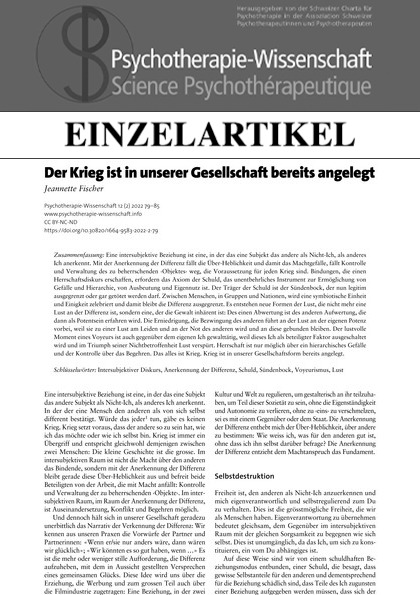War is already inherent in our society
DOI:
https://doi.org/10.30820/1664-9583-2022-2-79Keywords:
intersubjective discourse, recognition of difference, guilt, scapegoat, voyeurism, lustAbstract
An intersubjective relationship is one in which one subject recognises the other as a «not me» or «another me». Upon the recognition of this difference, arrogance and the resulting power gap are removed, and control and management of the dominated «object» is eliminated – producing the prerequisites for any war. Connections that create a discourse of power require an axiom of guilt – the essential instrument to make power gaps, hierarchies, exploitation, and self-interest possible. The bearer of the guilt is deemed the scapegoat, who can now be legitimately ostracised or even killed. Groups and nations enable people to celebrate a symbiotic unity and consensus creating the differences to facilitate ostracization. New forms of lust arise, no longer a lust for difference, but rather one in which violence is inherent: The degradation of one is the ascent of another, which is experienced by the latter as power. The humiliation and conquering of others, goes beyond a lust for power as it is bound with the lust for the suffering and misery of others. The lust-filled moment of a voyeur is also violent toward themselves as the participation of the self is eliminated and lust experienced in the triumph of remaining unaffected. Domination is only made possible via a hierarchical gap and retaining control of desire. All of this can be defined as war. War is already inherent in our society.
Downloads
How to Cite
Fischer, J. (2022). War is already inherent in our society. Psychotherapie-Wissenschaft, 12(2), 79–85. https://doi.org/10.30820/1664-9583-2022-2-79
Issue
Section
Special Issue
License

This work is licensed under a Creative Commons Attribution-NonCommercial-NoDerivatives 3.0 Unported License.
This journal provides open access to its content in accordance with the basic premise that the free public availability of research benefits the exchange of knowledge throughout the world.
Authors wishing to publish in this journal agree to the following:
- The author/s retain/s the copyrights and consent/s to initial publication of the work in the journal under a Creative Commons Attribution licence, which allows third parties to use the work by citing the name/s of the author/s and this journal as initial publisher (in accordance with the Creative Commons Attribution-NonCommercial-NoDerivs 3.0 DE-Licence).
- The author/s can enter into additional contracts for the non-exclusive distribution (e.g. publish in a collection or book) of the version published in the journal, if the journal is cited as initial publisher.


